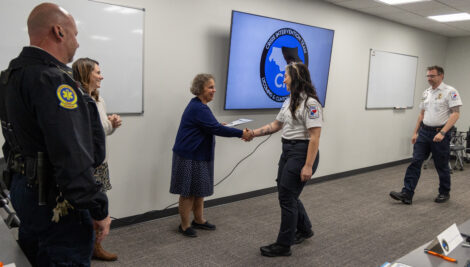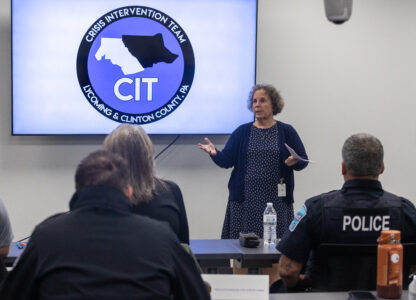‘More knowledge’: First responders graduate from crisis intervention training
- KAREN VIBERT-KENNEDY/Sun-Gazette Judge Nancy Butts hands the graduation certificate to MacKenzie Karasek of Susquehanna Regional EMS at the Lycoming/Clinton Crisis Intervention Team training graduation on Wednesday.
- KAREN VIBERT-KENNEDY/Sun-Gazette Judge Nancy Butts speaks about the importance of the work of the CIT team at the Lycoming/Clinton Crisis Intervention Team training graduation on Wednesday.
- 16 graduates of the Crisis Intervention Team of Lycoming and Clinton counties were presented with their certificates during a ceremony on Wednesday. The class included members of the Lycoming County Sheriff’s office, 911 dispatch, DCNR, Lycoming County Probation, Susquehanna EMS, Lycoming College Public Safety, Penn College Police and West Branch Drug and Alcohol Abuse Commission. KAREN VIBERT-KENNEDY/Sun-Gazette
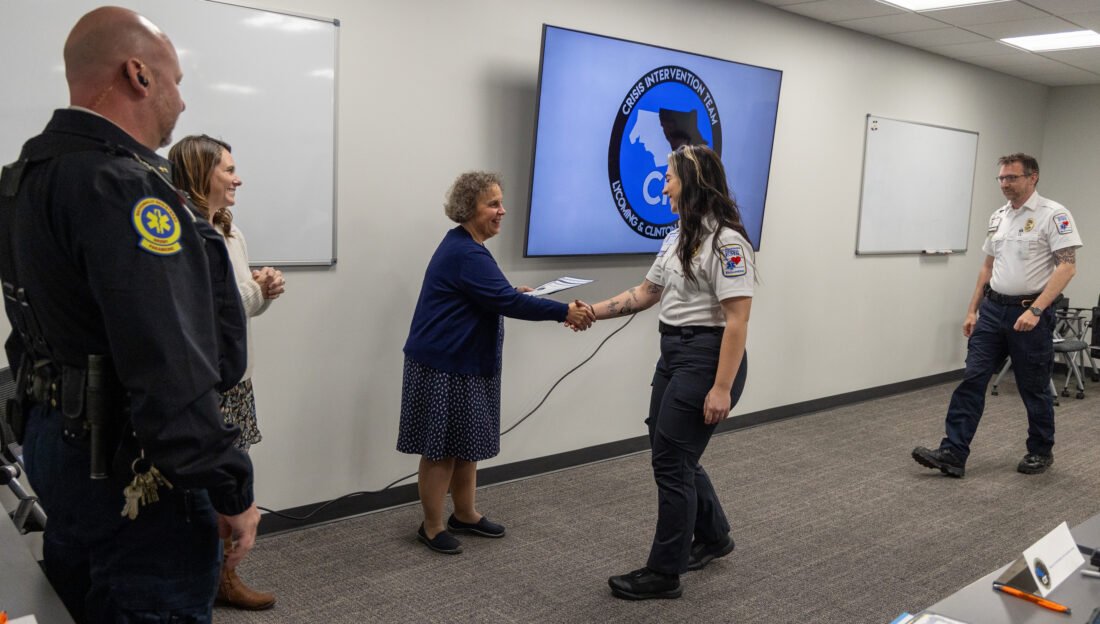
KAREN VIBERT-KENNEDY/Sun-Gazette Judge Nancy Butts hands the graduation certificate to MacKenzie Karasek of Susquehanna Regional EMS at the Lycoming/Clinton Crisis Intervention Team training graduation on Wednesday.
The community became just a little bit safer as 16 area first responders, representing a number of different disciplines, received certificates of completion of crisis intervention training Wednesday afternoon.
The responders received 40 hours of de-escalation training, including skill building scenarios to help first responders grasp the skills presented to them, according to Barb Vanaskie, Lycoming/Clinton County Crisis Intervention Team Coordinator.
“We also highlight mental health diagnoses. We talk about substance use. We talk about different ways to approach someone that might be on the autism spectrum,” Vanaskie explained.
“We also go out into the community and see where individuals that are struggling may be going,” she said.
More than 160 first responders and community based behavioral health providers have graduated from the training, which began in 2017.
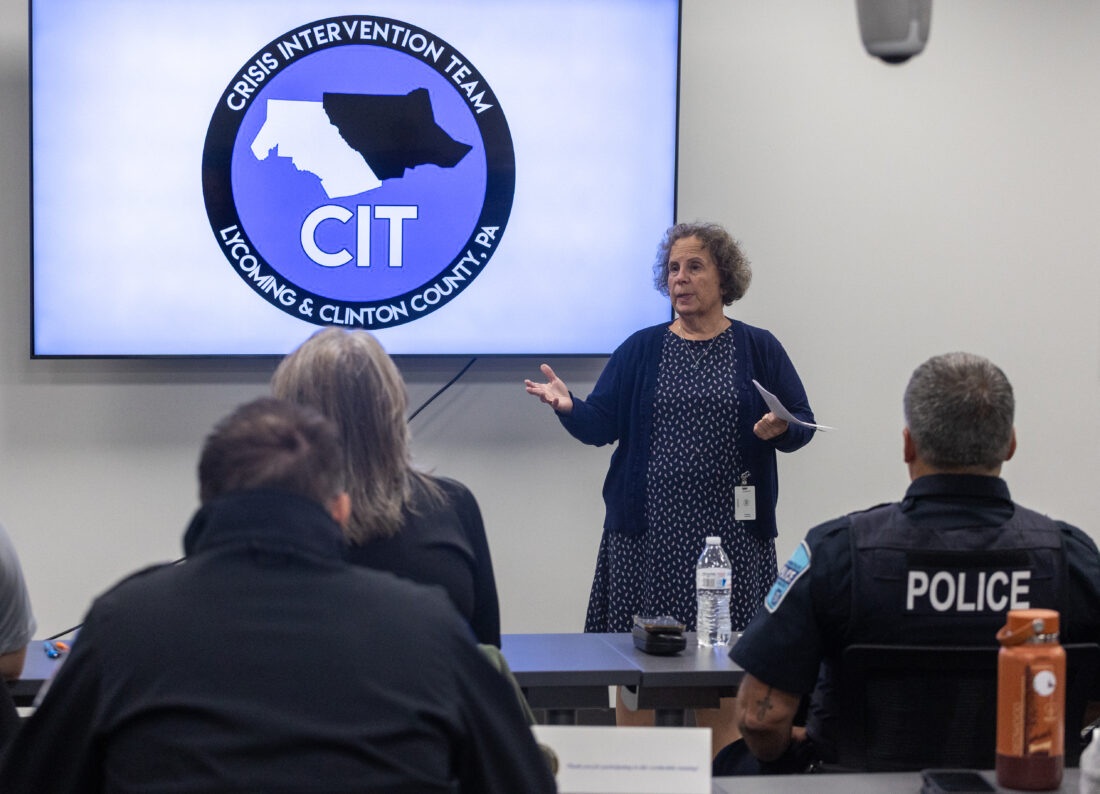
KAREN VIBERT-KENNEDY/Sun-Gazette Judge Nancy Butts speaks about the importance of the work of the CIT team at the Lycoming/Clinton Crisis Intervention Team training graduation on Wednesday.
Graduates have better access to tools allowing them to respond to situations in a safer manner, Vanaskie said.
“It’s the safety of the person responding to the crisis, whether that’s law enforcement, our crisis intervention team, EMS, as well as the safety of the individual in crisis, and then the community at large,” she said.
Lycoming County President Judge Nancy Butts was the keynote speaker at the ceremony.
Butts has a long history of public service, with many being aware of her time as a public defender, a clerk of courts, as an Assistant District Attorney, however she is also a certified emergency medical technician, and holds a master’s degree in clinical mental health counseling.
“I wanted to spend my career giving back and you all are doing that. This is a dying breed, and I think it’s because of the challenges that you face in the cases that you see that are so much more challenging than they ever were,” Butts said.
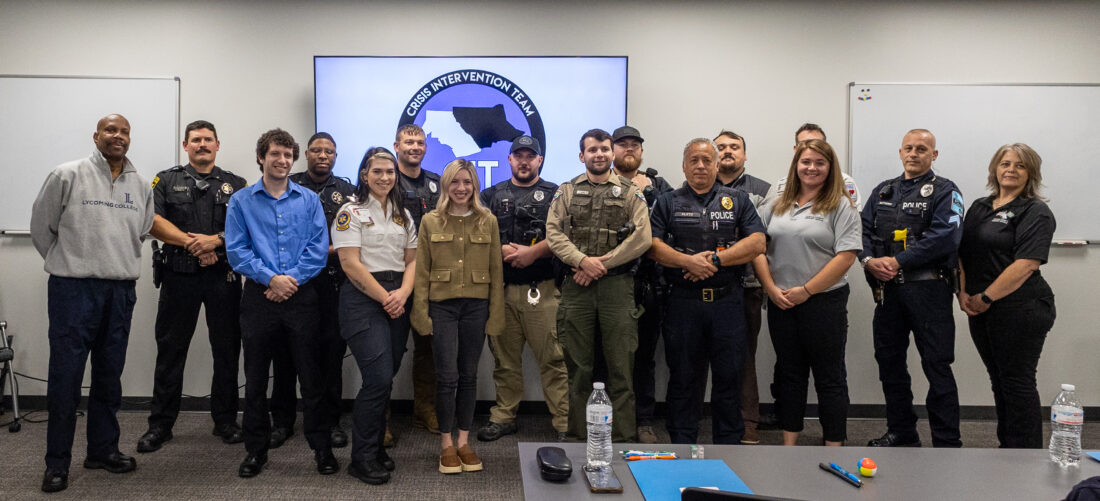
16 graduates of the Crisis Intervention Team of Lycoming and Clinton counties were presented with their certificates during a ceremony on Wednesday. The class included members of the Lycoming County Sheriff’s office, 911 dispatch, DCNR, Lycoming County Probation, Susquehanna EMS, Lycoming College Public Safety, Penn College Police and West Branch Drug and Alcohol Abuse Commission. KAREN VIBERT-KENNEDY/Sun-Gazette
Many people are under the impression that a call to 911, the police or involvement of the probation department may solve a particular problem, whereas the situation may be more complicated, requiring more resources to be brought in.
“The fact that you’ve participated in this program gives you an awareness of that extra dimension of what’s out there,” Butts said.
“You’ve now learned what’s out there. You learned who to call. You’ve heard presentations of people that are ready, willing and able to help. Whether it’s crisis or drug and alcohol, take advantage of them,” she urged, adding that just going through the training doesn’t equate to having all the answers.
“Even with treatment court, I have a team that helps me make decisions. So don’t be afraid to reach out to the people that you’ve met,” Butts said.
Utilizing these newly-acquired knowledge may help stave off unnecessarily sending someone into the criminal justice system, she stressed.
“Being on the prison board, we see an awful lot of people that are in jail, that are nonviolent offenders, who have mental health problems, and these individuals are not best served in a county prison. In fact, it can make it worse,” Butts said.
“Training is the way, not only to get continuing education credits, but to make you more effective at the job, make you feel more comfortable doing what you’re doing, and de-escalate in a situation that might happen, or out in the field when a family member is getting in the way of your ability to treat a patient, or when somebody comes into the office and is trying to tell you one thing and you know that something else is going on,” she said.
Pennsylvania College of Technology police officer Chad Buttorff was thankful for the training.
“It’s the ability to get more knowledge in the field, and to know that besides just the college itself, there’s the outside resources that can be used,” he said, noting that their job includes not only the college, but also the wider community.
“Almost all of our guys have been trained in CIT,” Penn College Police Chief David Pletz said, adding that while his fellow officers are on the streets more, he still got a lot out of the three-day training.
“We kind of knew some of the resources that were out there, but with this training, you get to hear from those resources exactly what they can do for you, so that you understand it more,” Pletz said.
“We now know what some of the things crisis can do or and we have some familiarity with some of the areas, like we went to the rescue workers, we went to Saving Grace, places like that, so we kind of understand how that process works for people that may be homeless,” he said.
“Having the training gives the officers all those extra tools in their belt, so we have all these different things at our disposal to use to help solve problems that we run into,” Pletz said.

